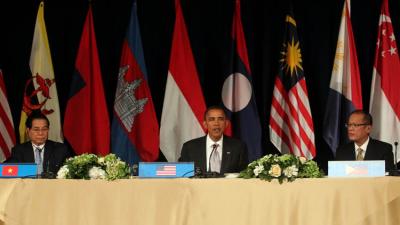ASEAN, during the meeting, also welcomed President Obama’s intention to participate in the East Asia Summit (EAS) beginning in 2011 and the attendance of Secretary of State Hillary Clinton as a guest of the chair at the Fifth EAS meeting on 30 October 2010 in Hanoi. EAS represents the latest avenue for both ASEAN and the United States to engage with each other and together with other non-ASEAN powers including China and Russia.
But ASEAN and the United States continued to downplay certain critical issues in their relationship.
First, although the issue of Myanmar’s political stalemate is mentioned in the joint declaration, it merely reflects the usual rhetoric put forward by ASEAN. The statement emphasises that Myanmar’s government should urgently act to ensure inclusive, free and fair elections. But Myanmar watchers remain cautious about the outcome of the elections which they believe represent only the junta’s attempt to prolong their domination of power.
Second, while the joint declaration inculcates the need to work toward a better and more secure region, security issues, like territorial conflicts in the South China Sea (SCS), which involve a number of members of ASEAN and China, are deliberately omitted. The statement only highlights that ‘We reaffirmed the importance of regional peace and stability, maritime security, unimpeded commerce, and freedom of navigation, in accordance with relevant universally agreed principles of international law, including the United Nations Convention on the Law of the Sea (UNCLOS) and other international maritime law, and the peaceful settlement of disputes.’
At a recent roundtable organised by the ASEAN Studies Centre at American University in Washington, academics and experts in the security field urged the United States to reassert its national interest in freedom of navigation in the SCS and vigorously encourage China to discuss SCS territorial issues multilaterally with ASEAN and its affected member states.
Many were convinced that the territorial conflicts in the SCS could further escalate and may lead to a full-blown war, and that existing security cooperative frameworks including the ASEAN Regional Forum (ARF) would not be able to tackle the issue without any support from the United States.
The ASEAN-US Leaders Meeting was partly designed to enhance the United States’ interest and presence in the Southeast Asian region and to contain the growing power of China — facts that have often been denied by Washington. It is therefore a disappointment that the United States failed to take a bolder step in regards to the conflicts in the SCS by sending a stronger message to Beijing.
Perhaps the United States has slowly but firmly become acclimatised to the so-called ASEAN way, where substance is often overshadowed by forms and rituals.
Pavin Chachavalpongpun is Lead Researcher for Political and Strategic Affairs, ASEAN Studies Centre, Institute of Southeast Asian Studies, Singapore.


It is curious that President Yudhoyono’s decision not to attend this summit has attracted so little comment, this post being yet another example. Similarly, his decision not to attend the ASEM meeting in Brussels on 4-5 October has failed to provoke much comment. SBY was to have visited the Netherlands, a visit he has now abruptly cancelled, immediately after ASEM, which makes his non-attendance even harder to understand.